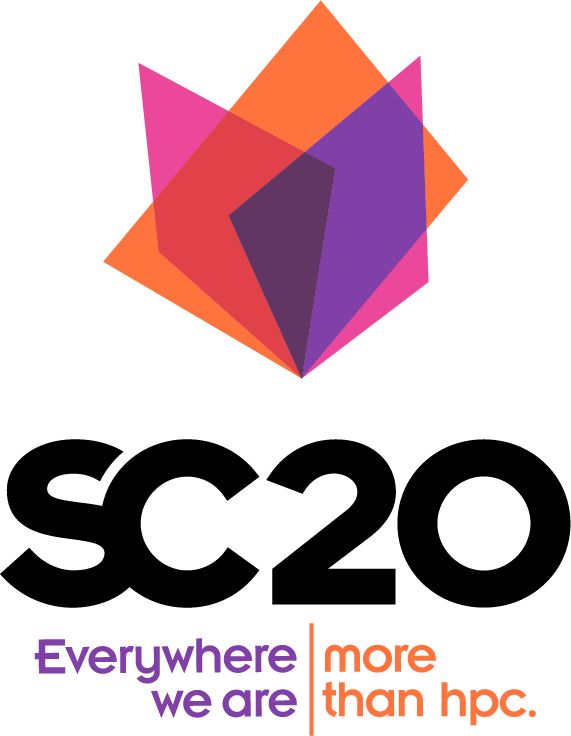IPDRM 2020
Fourth Annual Workshop on Emerging Parallel and Distributed Runtime Systems and Middleware
Virtual Event
Friday, November 13th, 2020
Atlanta, Georgia, USA.
Held in conjunction with the International Conference for High Performance Computing, Networking, Storage and Analysis, (SC 20), November 15-20, 2020, Atlanta, Georgia, USA.
FINAL EXTENSION Submission deadlines: September 14th, 2020 (AOE)
In collaboration with
Overview
Node architectures of extreme-scale systems are rapidly increasing in complexity. Emerging homogeneous and heterogeneous designs provide massive multi-level parallelism, but developing efficient runtime systems and middleware that allow applications to efficiently and productively exploit these architectures is extremely challenging. Moreover, current state-of-the-art approaches may become unworkable once energy consumption, resilience, and data movement constraints are added. The goal of this workshop is to attract the international research community to share new and bold ideas that will address the challenges of design, implementation, deployment, and evaluation of future runtime systems and middleware.
Topics
This workshop will emphasize novel, disruptive research ideas over incremental advances. We will solicit papers on topics including, but not limited to, the following areas:
Runtime System/Middleware Design, Evaluation and Usage
- Runtime/Middleware for emerging HPC and cloud computing platforms
- Runtime/Middleware for Big Data Computing
- Modeling and Performance Analysis of Runtime Systems
- Comparison studies of different runtime systems and middleware
- Tuning and Optimization studies
- Interactions between Runtime Systems and Middleware
- Runtime-architecture co-design
Constraints and Issues for Runtime Systems and Middleware
- Energy- and Power-aware schemes
- Fault Tolerance and Reliability
- Scalable high-performance I/O and access to Big Data
- Memory management
- Runtime data analysis (e.g., in-situ analysis)
- Real-time solutions and QOS
- Virtualization, provisioning, and scheduling
- Scalability of novel runtime systems and applications using them
Design Principles and Programming Support
- High-level programming models (e.g., thread and task based models, data parallel models, and stream programming) and domain-specific languages
- Programming frameworks, parallel programming, and design methodologies
- Methodologies and tools for runtime and middleware design, implementation , verification, and evaluation
- Wild and crazy ideas on future Runtime System and Middleware
Submissions
- Paper Submission: September 14th 2020 FINAL EXTENSION
- Paper Notification: October 1st, 2020
- Final Paper Due: October 10th, 2020
Submission Guidelines:
Full submission will be up to 8 pages long using the same format as the SC20 conference (i.e. using the IEEE template). This limit includes all materials (figures, bibliography, appendixes, etc). All submitted papers will undergo a rigorous review process and each will have at least three reviews by members of the program committee. Papers will be accepted based on their technical contributions. “Crazy and Wild ideas” are welcome. Accepted papers will have quick lighting presentations on the workshop day to spark conversation and discussion. Papers can be submitted at https://easychair.org/conferences/?conf=ipdrm2020
Instructions for the Virtual Workshop
Due to the current COVID pandemic, IPDRM will be virtual this year. For all the accepted papers, instructions on how to setup your presentations are provided in this file. For attendees, the login information will be availble near the day of the workshop.
Organizing Committees
General Chairs
- Shuaiwen Leon Song, University of Sydney
- Guang R Gao, University of Delaware
- Barbara Chapman, Brookhaven National Laboratory and Stony Brook University
- Joshua Suetterlein, Pacific Northwest National Laboratory
- EunJung Park, Los Alamos National Laboratory
Program Chairs
- Shirley Moore, OakRidge National Laboratory, USA
- Joseph Manzano, Pacific Northwest National Laboratory, USA
Publicity Chair:
- Jiajia Li, Pacific Northwest National Laboratory, USA
Publication Chair:
- Jose Monsalve Diaz, University of Delaware, Argonne National Laboratory, USA
European Liaison:
- Marc Casas, Barcelona Supercomputing Center, Spain
Program Committee
- Vinay Amatya, Pacific Northwest National Laboratory, USA
- Kevin Barker, Pacific Northwest National Laboratory, USA
- Mehmet Belviranli, Colorado School of Mines, USA
- Vincet Cave, Intel, USA
- Phillippe Clauss, INRIA, University of Strasbourg, France
- Sankha Dutta, University of California, Riverside, USA
- Gokcen Kestor, Pacific Northwest National Laboratory, USA
- Ivy Peng, Lawrence Livermore National Laboratory, USA
- Bin Ren, William & Mary College, USA
- Omer Subasi, Pacific Northwest National Laboratory, USA
- Li Tang, Los Alamos National Laboratory, USA
- Zhijia Zhao, University of California, Riverside, USA
- Christopher Zimmer, Oak Rdige National Laboratory, USA
Program
| Time | Paper / Session Title | Authors |
|---|---|---|
10:00-10:05 |
IPDRM 2019 Intro | TBA |
10:05-10:45 |
Keynote: | |
10:45-11:10 |
Scheduling across Multiple Applications using task based programming models | Minh Chung, Josef Weidendorfer, Philipp Samfass, Karl Fuerlinger, Dieter Kranzlmuller |
11:10-11:35 |
MENPS: A decentralized distributed shared memory exploiting RDMA | Wataru Endo, Shigeyuki Sato, Kenjiro Taura |
11:35-12:00 |
RaDD Runtimes: Radical and Different Distributed Runtimes with SmartNICs | Ryan Grant, Whit Schonbein, Scott Levy |
12:00-12:35 |
LUNCH | |
12:35-13:00 |
DEMAC, A Modular Platform for HW-SW Co-Design | Diego Andres Roa Perdomo, Jose Manuel Monsalve Diaz, Ryan Kabrick, Siddhisanket Raskar, Dawson Fox, Guang R. Gao |
13:00-13:25 |
CODIR: Towards an MLIR Codelet Model Dialect | Ryan Kabrick, Diego Roa Perdomo, Siddhisanket Raskar, Jose Monsalve Diaz, Dawson Fox, Guang R. Gao |
13:25-13:50 |
MPI meets Cloud: Case Study with Amazon EC2 and Microsoft Azure | Shulei Xu, Seyedeh Mahdieh Ghazimirsaeed, Jahanzeb Maqbool Hashmi, Hari Subramoni, Dhabaleswar Kumar Panda |
13:50-13:55 |
Conclusion |

